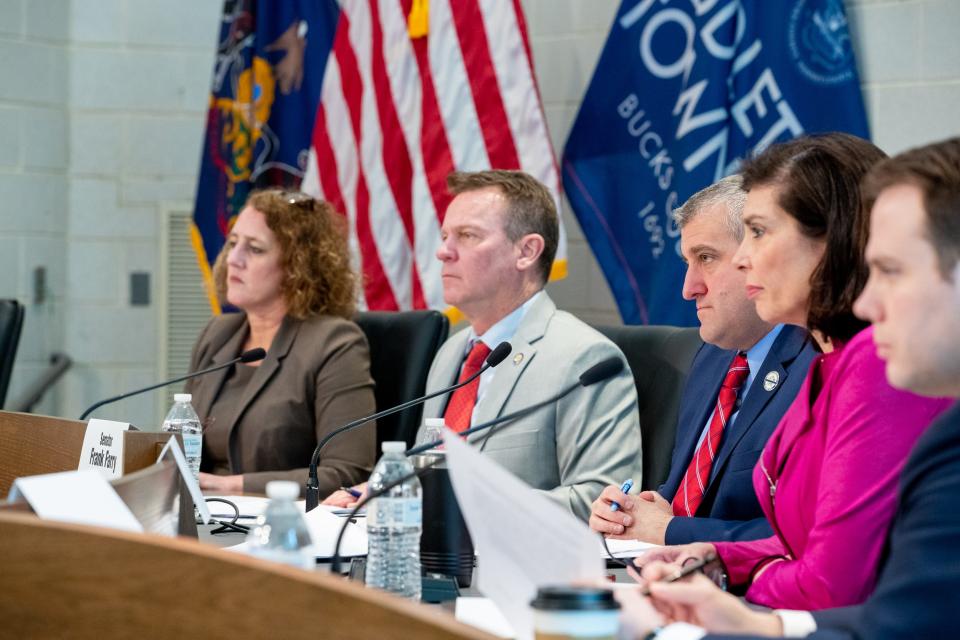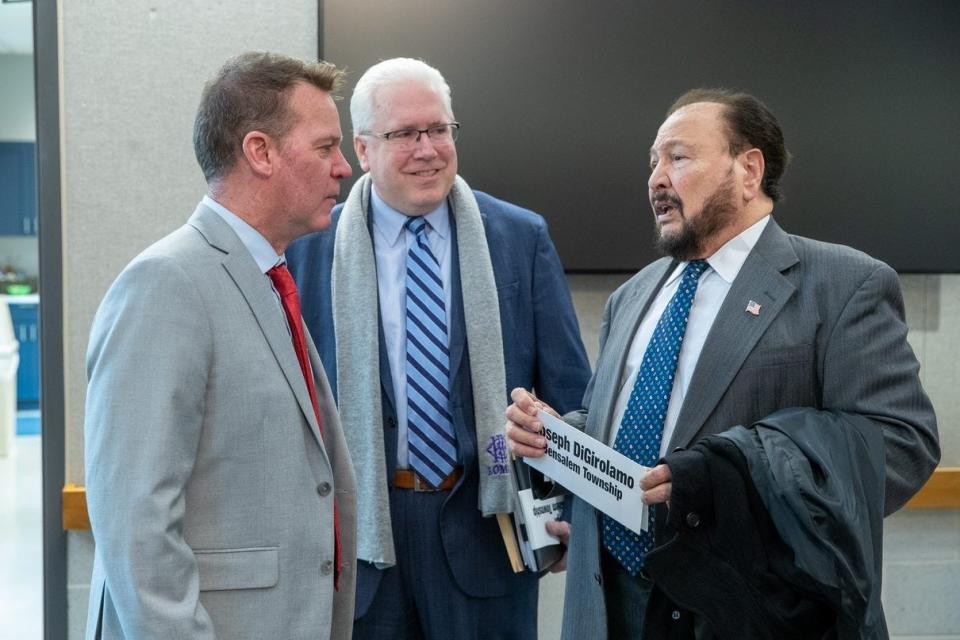City wage tax collects millions from Bucks County for Philadelphia. Some want funds to stay here
The Philadelphia Wage Tax is the bane of many Bucks County residents who work for employers in the city, as well as officials who want those residents to pay earned income tax to the municipalities where they live in the suburbs.
Members of the Pennsylvania Senate Majority Policy Committee came to Middletown on Thursday at the invitation of state Sen. Frank Farry, R-6, to learn the impacts of the wage tax, which was established in the 1930s by the Sterling Act as an emergency measure to help Philadelphia through the Great Depression.
Philadelphia's long history of taxing wages

Ninety years later, the tax on the wages of all workers in the city — both residents and non-residents — is still in place. The tax is set at 3.44% for non-residents and 3.79% for city residents.
Because they pay the wage tax, Bucks residents working in Philadelphia don’t have to pay the earned income tax that most municipalities charge, or split with their school districts. In most locales, this tax is 0.5 or 1% and a worker pays it to the municipality and school district in which they live.
That is the rub of the Sterling Act, say those who attended the hearing.
Tax dollars are needed to fund the extra police, fire and street services now needed in Bucks County since much development has taken place over the past several decades. But Bucks residents who work in the city are still paying a tax on their income to Philadelphia but none to their home communities.
And since the pandemic, many are working from home yet owe the city's tax if their employer allows them the option to return to their jobs there, said former state Rep. Wendi Thomas of Northampton.
Millions of Bucks County tax dollars flow to Philadelphia
“This act is not fair,” said Northampton Township Manager Robert Pellegrino, who noted that his municipality has 2,600 residents working for Philadelphia firms “who do not pay any tax (to Northampton). It puts it on other residents to fund the services ... As we grow, our services need to grow."
He estimated Northampton was losing about $1.1 million annually by not collecting an earned income tax from these residents. That money, he said “would be a huge help in meeting our goals to fund government services ... We desperately need additional revenue," he said, for more paid firefighters because of the difficulty in finding volunteers.
Joseph Lazzaro of the Keystone Collections Group which bills most earned income taxes in Bucks, said the Council Rock School District was losing $1.75 million and Bensalem, which borders the city and has the most residents working there is losing $2.5 million in tax dollars.
The Bucks County Association of Township Officials' data shows that 20,377 residents from dozens of Bucks County municipalities work all or part of the work week in Philadelphia.
"While that number may be a small percentage of our population, it represents a big loss of tax revenue ... Bucks residents working in Philly have no choice but to leave behind nearly $9 million in annual municipal earned income tax," said Stacey Mulholland, association executive director.
Philadephia needs revenue from wage tax

Philadelphia Director of Finance Rob Dubow sent the committee a letter noting the city would oppose changes to the Sterling Act or a Local Enabling Act since the city would lose $190 million annually in tax funds if it couldn't tax its non-resident workers. The Republicans acknowledged this would have a devastating impact on the city.
But Dubow said it would also negatively impact the suburbs since a Wharton study shows the city is an economic engine for the entire region. "Philadelphia has a substantial portion of the five-county region’s jobs. We are home to leading institutions for patient care, medical research, higher education, and legal services," he said.
Bensalem Mayor Joseph DiGirolamo testified that Bensalem feels the financial pinch of the wage tax the most of any Bucks municipality because it borders the city. Not only does it have the most residents working there ― 3,800, but it also must provide services to the many Philadelphians who come to Bensalem to work or to buy cigarettes and soda, which are heavily taxed in the city.
"Eighty percent of the crime in Bensalem comes out of Philadelphia. We’re paying the price,” he said.
“We’re not asking for anything that’s unfair,” DiGirolamo said.
He suggested the state allow local municipalities to collect from residents who work in the city the 1% earned income tax and the city keep the 2.44% more it charges them. He would implement this over five years.
State Sen. Jarrett Coleman, R-16, serving Upper Bucks and Lehigh counties, wants to see the wage taxes be returned to Bucks residents, “putting money back in their pockets.”
Pennsylvania Senate has a "tough" fight ahead to change city wage tax
State Sen. Dan Laughlin of Erie, chair of the Majority Policy Committee, said the Sterling Act needs to change but it will be "tough" to get the Democratic-controlled House with many members from Philadelphia, to go along.
Farry urged residents to write to their legislators to push for changes to the Sterling Act. He was able to gather senators from across the state and more than 40 municipal officials for Thursday's hearing. “This is the most attention we’ve been able to get," he said.
This article originally appeared on Bucks County Courier Times: Philadelphia city wage tax should be reformed, hurting Bucks County towns: GOP

